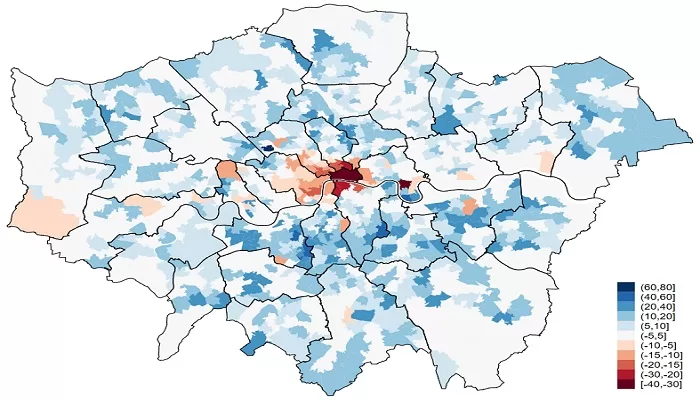Education
City Centres Could Lose £3 Billion Due to Permanent Changes Caused by Covid-19, New Study Reveals

In 2022 the average UK worker will be working from home 20 percent more (one day a week) than they were prior to the pandemic, having huge consequences for the retail and hospitality industries
- City centres stand to lose £3 billion in revenue due to these changes
- The study reflects the economic impact of the pandemic, with workers around the world taking advantage of the newfound flexibility in working location from their employers
- Approximately 77,000 hospitality and retail workers could be forced to relocate or lose their jobs completely.
A new study has calculated the long-term economic impact of Covid-19 on city centres and found that as the shift towards working from home moves businesses to suburban areas, city centres stand to lose £3 billion in 2022.
Economists from the University of Nottingham, the University of Sheffield, and the University of Birmingham, assessed how often people will be working from home in the next year compared to before the pandemic, and what effect that will have on the revenue generated by city centres.
Their research, funded by the Economic and Social Research Council, is published in a paper titled “Covid reallocation of spending: The effect of remote working on the retail and hospitality sector”.
The study uses data from a new Working From Home Survey developed by Professor Paul Mizen, Professor Gianni De Fraja, Gregory Thwaites and Shivani Taneja at the University of Nottingham, with the University of Chicago and Stanford University.
The academics found that on average, people will be working roughly one day a week more at home than they were before the pandemic, which could have huge long-term consequences for the hospitality and retail industries, which have already faced a tumultuous 18 months.
It is expected that the extra day of working from home will be a permanent shift as a result of the pandemic, which has seen everyone’s lives change dramatically since the first national lockdown in March 2021.
As people spend more time in suburban areas due to working from home, they will not be providing the economic benefits to city centres that office workers previously would, such as going to coffee shops, buying lunch, or going shopping after work. These shifts could see roughly 77,000 people who work in the hospitality and retail industries being forced to either relocate to jobs in suburbs or lose their jobs completely.
Not only could these changes lead to tens of thousands of low-income workers losing their jobs, but it could make inequalities between rich and poor areas even worse – the study found that people who are more affluent are more likely to be able to work from home, the money being lost by city-center shops is more likely to be recuperated in higher-income suburbs.
Professor Paul Mizen, in the School of Economics at the University of Nottingham said: “Using a new Working From Home survey developed at the University of Nottingham in collaboration with the University of Chicago and Stanford University, our team from Nottingham, Birmingham, and Sheffield universities has tracked changes in commuting patterns and working from home trends during Covid lockdown periods to show that about £3 billion in annual spending could leave city centres as a result of working from home.”
The Nottingham academics have also been tracking the opinions of business through the Decision Maker Panel, set up with the Bank of England and Stanford University, providing direct insight into business expectations and uncertainty, for example, Covid-19 and Brexit. The panel draws information from Financial Officers in 3,000 UK companies operating in a broad range of industries and is designed to be representative of the population of UK businesses.
Dr. Jesse Matheson, the co-author from the University of Sheffield’s Department of Economics, said: “We estimate that about £3 billion in annual spending will leave city centres as a result of working from home. This decrease will be concentrated in a few very dense centres; for example, the City of London will experience a spending decrease of 31.6 percent, and central Birmingham will experience a decrease of 8 percent. Some of this spending will be realized in the residential areas where these workers live, but some may be lost altogether. As suburban neighborhoods lack the density of city centres, many retail and hospitality businesses will find it is not profitable to relocate.
“Workers in retail and hospitality may also find that demand has shifted to locations to which commuting is too difficult, which means that supply may not be able to keep up with demand.”
As a result of this shift to working from home – or the effect of ‘zoomshock’ as the academics coined the phenomena – the report argues that city centres may have to transform themselves in order to stay relevant, by becoming more residential instead of retail-focused. The research follows a previous study by Dr. Matheson which found that how quickly households or businesses recover from the economic impact of Covid-19 depends on where you live and what you do, as wealthier areas will be quicker to recover.
Dr. Matheson says there is work to do in finding out if all of the lost £3 billion will be spent elsewhere or lost altogether. He said: “This money may be recuperated in the higher-income suburbs, but in a lot of places working from home means people are more spread out, which isn’t good business for a retail business like coffee shops, who require high-density areas for business. So there is a risk this revenue could be lost from the hospitality and retail sectors forever.”
Source: University of Nottingham






















































